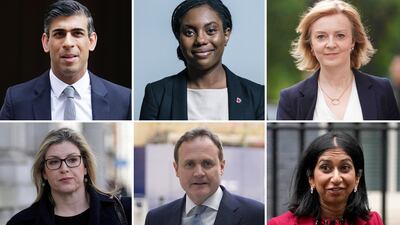The key number of votes for candidates in the UK Conservative Party's leadership race for any candidate is 120 votes that means the contender automatically progresses to the final pair.
The hurdle to clear remains 30 MPs but with a twist, not to come last as the bottom ranking will be eliminated on Thursday as the second round balloting takes place.
The person who receives the fewest votes — to be announced at 3pm British time — will automatically be knocked out in the second ballot to become party leader and UK prime minister.
But more candidates could potentially exit the race if they drop back, scoring below 30.
Solicitor General Suella Braverman, who got 32 votes on Wednesday, and Tom Tugendhat, who received 37, are the most vulnerable to coming last.
There is also the possibility that some of their supporters may abandon them to vote for front-runners — who are emerging as former chancellor Rishi Sunak, Trade Minister Penny Mordaunt and Foreign Secretary Liz Truss.
It is possible that two candidates could leave the race on Thursday through the ballot box, or some might decide to drop out and publicly support another contender.
This magic number is achieved by dividing 358 — the number of Conservative MPs — by three. For example, two people could achieve 120 votes, leaving the third on 118.
Currently, Mr Sunak — who received 88 votes on Wednesday — is closest to achieving that figure but this is by no means guaranteed.
In the final round of the 2019 party leadership vote, Boris Johnson received 160 votes, Jeremy Hunt 77 and Michael Gove 75 out of a total of 313 Conservative MPs.












































































